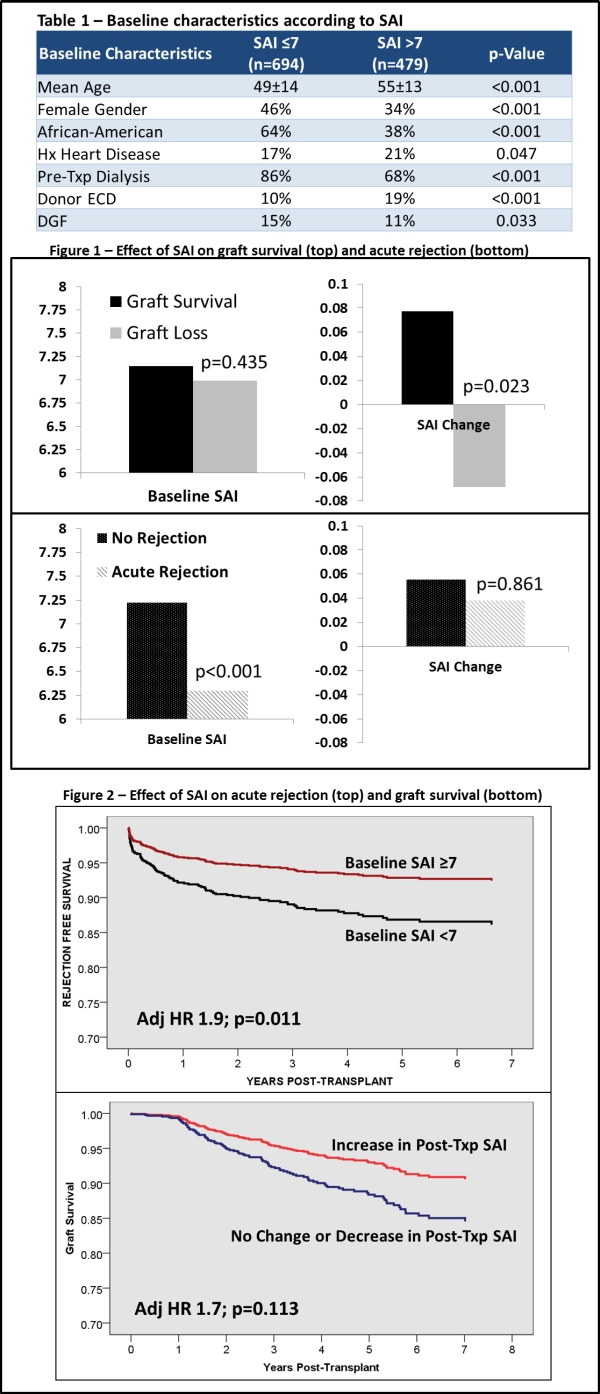The Impact of Baseline and Follow-Up Social Adaptability Index Scores on Outcomes in Kidney Transplantation
MUSC, Charleston, SC.
Meeting: 2015 American Transplant Congress
Abstract number: A226
Keywords: Graft survival, Kidney transplantation, Rejection
Session Information
Session Name: Poster Session A: Non Organ Specific, Economics, Public Policy, Allocation, Ethics
Session Type: Poster Session
Date: Saturday, May 2, 2015
Session Time: 5:30pm-7:30pm
 Presentation Time: 5:30pm-7:30pm
Presentation Time: 5:30pm-7:30pm
Location: Exhibit Hall E
Globally, socioeconomic status (SES) is a significant determinant of health outcomes, with the social adaptability index (SAI) representing a quantifiable and validated surrogate of SES. While studies have associated baseline SAI score with graft loss in kidney transplantation (KTX), the impact of dynamic evolution of post-transplant SAI on graft outcomes is unknown.
Methods: Longitudinal cohort study in adult KTX with the primary aim of determining the impact of both baseline and yearly post-transplant SAI scores on graft loss and acute rejection. Solitary KTX recipients transplanted at a single-center between 2005 and 2012 were included. The SAI score includes 5 domains (employment, education, marital status, substance abuse and income), each with a min of 0 and max of 3 for an aggregate range of 0 to 15.
Results: We included 1,176 patients; overall mean baseline SAI: 7.1±2.5, with 7.2±2.5 at last follow-up, ;mean change: 0.05±1.09 (p=0.092). Those with low baseline SAI (<7) were more likely to be younger, female, African-American, and on dialysis (Table 1).Baseline SAI was lower in those with acute rejection (p<0.001), while SAI change from baseline to last follow-up was significantly lower in those with graft loss (p=0.023, Figure 1). Multivariable modeling, using Cox regression confirmed these findings (Figure 2).
Conclusion: Low baseline SES, as measured by SAI, appears to be a risk factor for acute rejection, while a lack of increase in post-transplant SES is a significant risk factor for graft loss. Results suggest that interventions to mitigate the effects of SES on graft outcomes should target both low SES and its dynamic evolution.

To cite this abstract in AMA style:
Taber D, Hamedi M, Gebregziabher M, Srinivas T, Chavin K, Egede L, Baliga P. The Impact of Baseline and Follow-Up Social Adaptability Index Scores on Outcomes in Kidney Transplantation [abstract]. Am J Transplant. 2015; 15 (suppl 3). https://atcmeetingabstracts.com/abstract/the-impact-of-baseline-and-follow-up-social-adaptability-index-scores-on-outcomes-in-kidney-transplantation/. Accessed February 17, 2026.« Back to 2015 American Transplant Congress
